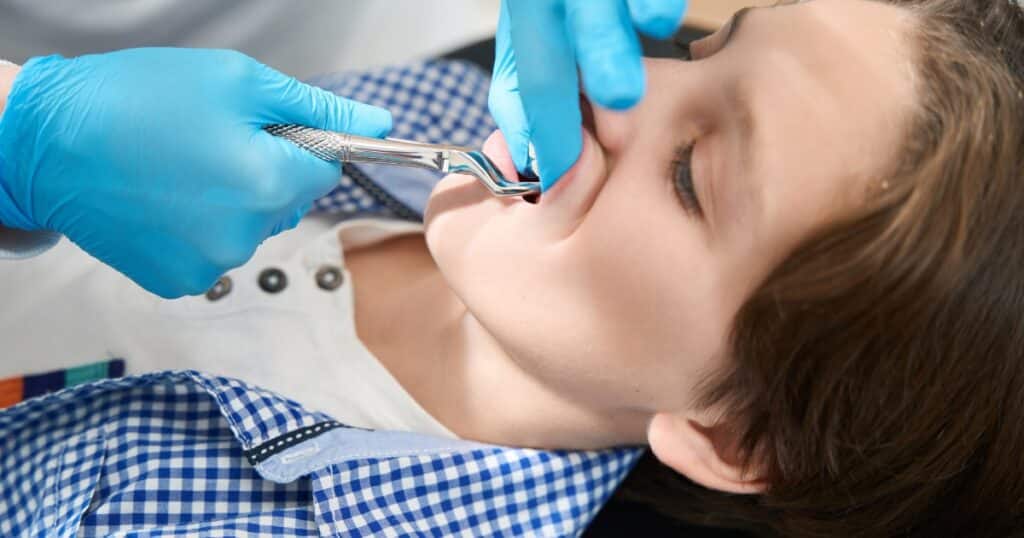Fractured teeth, a common dental concern, can arise from various situations, ranging from biting down on hard objects to sustaining facial trauma. While a minor chip might seem inconsequential, neglecting proper dental intervention can lead to a cascade of complications impacting your oral health, overall well-being, and even self-confidence.
Painful Progression
A fractured tooth can be a source of significant discomfort, particularly during chewing or exposure to extreme temperatures. Exposed dentin, the layer beneath the enamel, is highly sensitive, leading to throbbing pain that disrupts sleep and daily activities. While over-the-counter pain relievers might offer temporary relief, they don’t address the underlying cause and could mask a more serious issue developing within the tooth.
Inviting Infection
The exposed area created by a fracture presents a prime entry point for bacteria. These unwanted guests can establish a foothold within the tooth, leading to an infection. This can progress into an abscess, a pus-filled pocket that not only causes significant discomfort but also carries the risk of spreading if left untreated. Symptoms like facial swelling, fever, and difficulty swallowing might indicate an abscessed tooth, necessitating immediate dental attention.
Compromised Oral Health
A fractured tooth disrupts the delicate balance within your mouth. It can place undue stress on surrounding teeth, increasing their susceptibility to cracks, chips, or even loosening. This domino effect can compromise the overall health and stability of your entire smile. Additionally, a fractured tooth can disrupt your bite, making chewing difficult and straining your jaw muscles. Over time, this strain can lead to headaches and temporomandibular joint (TMJ) dysfunction.
Nutritional Concerns
Depending on the location and severity of the fracture, chewing might become difficult or even painful. This can negatively impact digestion and make it challenging to obtain the essential nutrients your body needs from food. Restricted chewing can lead to changes in dietary habits, potentially resulting in nutritional deficiencies.
Speech Difficulties
In some instances, a fractured tooth, especially if it’s a front tooth involved in speech formation, can affect your pronunciation. This can manifest as slurring or difficulty enunciating specific words. While seemingly a minor inconvenience, speech impediments can erode self-confidence and hinder communication in both social and professional settings.
Psychological Impact
Let’s face it, a fractured tooth isn’t exactly a smile booster. It can lead to self-consciousness about your appearance, especially when interacting with others. Smiling is a powerful tool for expressing happiness and confidence, and a fractured tooth can hinder your ability to freely share your smile with the world.
The Power of Professional Intervention
The good news is that there’s no need to suffer through these consequences! Dentists possess a comprehensive arsenal of tools and techniques to address fractured teeth. Depending on the extent of the damage, treatment options may include bonding for minor chips, fillings for deeper cracks, or crowns to restore the tooth’s strength and structure. In some cases, a root canal might be necessary to eliminate infection and preserve the tooth. If the tooth is severely damaged beyond repair, extraction followed by replacement options like implants or bridges might be the most suitable course of action.
Prevention is Paramount
Early intervention is key! A prompt visit to the dentist can prevent a seemingly minor fracture from escalating into a major dental emergency. A dental professional can assess the damage, recommend the most appropriate treatment course, and restore your smile’s health and functionality. Remember, acting swiftly not only saves you from potential pain and discomfort but also helps safeguard your oral health and overall well-being.
Considering Cosmetic Dentistry
While addressing the functionality of a fractured tooth is the primary concern, some patients might also prioritize the cosmetic aspect. Dentists with a focus on cosmetic dentistry can address both the health and appearance of your smile. Techniques like veneers or teeth whitening can be employed in conjunction with restorative procedures to create a natural-looking, healthy smile you can confidently share with the world.


